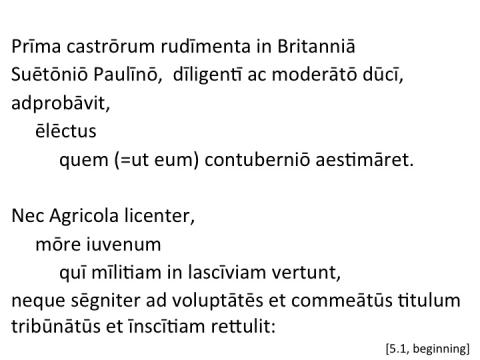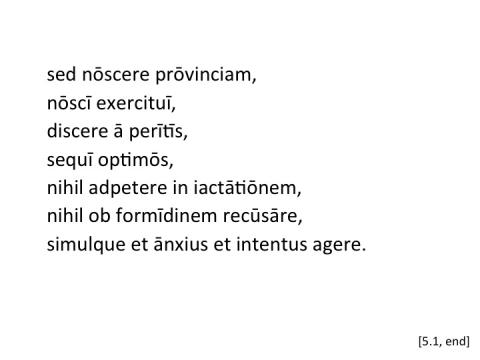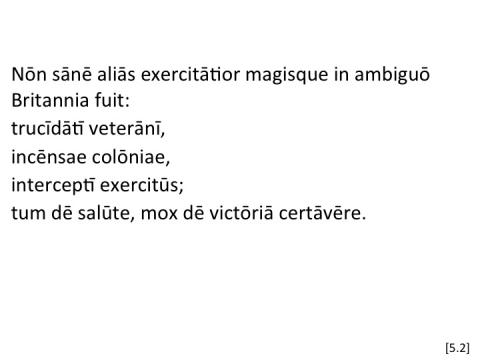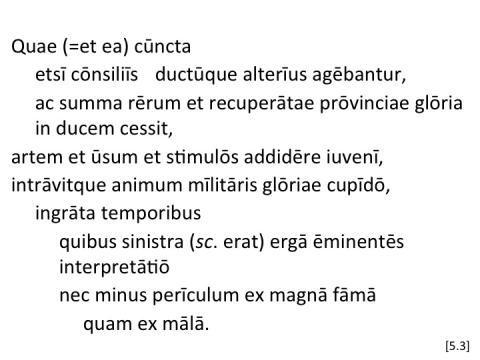Overview: Agricola's apprenticeship in arms; his deportment in the service; he conceives a taste for military renown. (Stuart)
5.1
rudīmenta: literally, “first attempts.” In imperial Latin the word has often a technical sense, equal to tirocinium, or military novitiate. (Stuart)
Suētōniō Paulīnō: a distinguished general, legatus pro praetore in Mauretania, in 41-42 CE, in which latter year he was probably consul suffectus. From 59-61 CE he was legatus In Britain. Consul in 66 CE, and in 69 CE he led the Othonian forces against Vitellius, who subsequently pardoned him. (Gudeman)
dīligentī ac moderātō dūcī: elsewhere Tacitus says that he enjoyed a reputation as a general second to none. (Stuart) moderātō: “discreet.” (Pearce)
adprobāvit: adprobāre = “to approve a thing to a person.” i.e. “to win a person's approval for a thing.”
(Pearce); i.e. he served his military apprenticeship so as to win the approval of his chief. On the conciseness of expression, see Introd. p. xxxiii, #10. (Gudeman)
ēlēctus: here, as elsewhere in Tacitus, the priority of time resident in the past participle is ignored. Agricola's admission to the staff of Suetonius was a mark of the approval that the young soldier had previously won. Translate: “and was chosen.” (Stuart); the 'aoristic' past participle, as we have already had it in the abl. abs. construction. It is explanatory of adprobavit. (Pearce) [A&G §473]; in place of the participle, we should expect a finite verb, as the approbation cannot have followed the selection. For an analogous elimination of the temporal force of the perfect participle, see note ch. 29.1, ictus ... amisit. (Gudeman)
contuberniō: the ablative denotes the value at which he was rated. (Stuart) [A&G 416] aestimāret: the characterizing subjunctive. (Stuart) [A&G 535] quem contuberniō aestimāret: the subjunctive is either (1) final, "in order to test him by giving him an appointment on his staff"; "for the test of nearer companionship"; or (2) consecutive, "as one whom he thought worthy of a place on his own staff." In (1) contubernio is abl. of means; in (2) abl. of price, a meaning derived from that of "means." (Pearce) [for the subjunctive A&G 531.2 and 535; for the ablative A&G 409 and A&G 416]; i.e. having been selected by Paulinus to test his worth by tenting with him. contubernio is an instrumental ablative. (Gudeman) [A&G 409]
nec: to indicate connection with the preceding sentence, “And Agricola neither.” (Stuart); = et neque. (Gudeman)
licenter: “for wanton ends,” explained by the following clause and balanced by segniter, which is in turn developed in the phrase ad ... commeatus. Agricola did not take advantage of his rank and the fact that the services of a tyro were dispensable either to indulge in excesses or to obtain exemptions from duty. (Stuart); (explained by more ... vertunt) and segniter correspond respectively to voluptates and commeatus. (Pearce) licenter ... segniter: i.e. neither licentiously, etc., nor owing to slothfulness did he take advantage of his titular tribuneship, etc., to secure through furloughs opportunities for enjoyment. The et after voluptates is epexegetic. See Introd. p. xxx,#18. (Gudeman)
iuvenum: the military tribunes who served under provincial governors were often representatives of the gilded youth of Rome who had no desire for military promotion. They went out to fill their purses or to qualify for office (tribuni honores petituri). (Stuart)
ad voluptātēs et commeātūs: "as excuses for obtaining the pleasures of furlough." (Stuart)
titulum tribūnātūs: in order to become qualified for a senatorial career ... a young noble had to serve for a year as tribunus militum. As we see here, the duties were often not taken seriously. (Pearce)
nec ... rettulit ad: “he did not through self-indulgence (like most young men, whose military service is a time of irregularities) or through idleness make his honorary rank and inexperience an excuse for pleasure or leave of absence.” Referre ad, “to refer to some end,” i.e. "to make something the end or aim of one's actions." (Pearce)
nōscere: for a similar accumulation of historic infinitives, see note on 38.1. (Pearce) [A&G 463] nōscere ... nōscī: Tacitus repeatedly joins the active and passive of the same verb, e.g. Germ. 19, conrumpere et conrumpi. Observe the skillful balancing of clauses and the accumulation of seven historical infinitives. In ch. 19.2-19.4. we have eight, in ch. 38.1, ten. This number is rarely exceeded. (Gudeman)
exercituī: on the subjective dative, see note on Arulēnō Rūsticō, ch. 2.1. (Gudeman) [A&G 375a]
in iactātiōnem: “with a view to self-display.” In with the accusative is often used to express a result aimed at consciously or unconsciously. (Pearce); in final is perhaps more common in Tacitus than in any other writer. On the chiasmus, see Introd. p. xxviii, #4. (Gudeman)
simulque: i.e. while he refused no dangerous service (nihil ... recusare).
(Pearce)
ānxius: here, "circumspect." (Stuart); i.e. with a proper sense of responsibility, "cautiously," an unusual sense. Translate: “and yet (simul) he showed caution as well as energy in his conduct of affairs.” (Pearce); “cautiously.” Agricola never underestimated the strength of the enemy, an attitude which he owed to the training of Paulinus. (Gudeman)
5.2
exercitātior: “more agitated.” (Gudeman)
magisque in ambiguō: “in a more doubtful situation.” (Stuart) in ambiguō: i.e. for the Romans.
(Pearce)
trucīdātī ... exercitūs: incidents of the revolt led by Boudicca in the year 61 CE. See chapters 15 and 16. Veterans settled in Camulodunum, the only British colonia that had as yet been founded, were attacked and massacred and the town was burned. The Ninth Legion marched to the rescue, but was cut off and well-nigh annihilated. The plurals coloniae and exercitus are justifiable because Tacitus was intent on presenting events not numerically but generically. There were massacres of veterans, burnings of Roman colonies, etc. (Stuart) trucīdātī veterānī: they were in garrison at Camulodunum (Colchester). Such a colony of veterans was calculated to keep down a conquered country and to form a centre of Roman influence. (Pearce)
colōniae: we only know of Camulodunum, as Verulamium and Londinium were municipia. But the vague plural expresses more vividly the panic which did not stay to weigh words. (Pearce); there was only one colony, Camulodunum, the modern Colchester. The poetical plural is here used, as in 21.1 templa, for the sake of symmetry with the other substantives. The same applies to intercepti exercitus, the allusion being apparently to the defeat of the Ninth legion. On the force of the asyndeton, see Introd. p. xxvii, #11a. (Gudeman)
interceptī: "were cut off and destroyed."
(Stuart) interceptī exercitūs: “our armies isolated.” Again a vague plural used of one army. Or (with Dräger) the plural denotes the various divisions of the army. (Pearce)
tum: i.e. at the time of the first rising.
(Pearce) tum dē salūte: the antithesis seems to have been a commonplace. (Gudeman)
mox: as often in Tacitus is equivalent to deinde. (Stuart)
5.3
alterīus: not “the other,” but “another.” It stands for the genitive of alius, which is seldom used. (Stuart)
summa rērum: "the chief credit for the campaign." (Stuart); “the supreme responsibility.” (Pearce); "the successful issue of the campaign, namely, the restoration of the province, was attributed to the commander-in-chief." The et adds a more specific to a general statement, according to a stylistic usage characteristic of Tacitus. See Introd. p. xxx, #18. (Gudeman)
recuperātae: render as a substantive, comparing the phrase ab urbe condita. (Stuart) [A&G 497]
in ... cessit: “fell to the share of.” (Pearce)
artem et ūsum: he learned the theory and the practice of warfare. (Stuart)
intrāvitque: “and there entered.” See Introd. p. xxvi, #3. (Gudeman)
cupīdō: this shorter form for cupiditas is found only here in the smaller works. (Gudeman)
ingrāta: that is, to those in power. Temporibus is best explained as an ablative. The reference is not to any particular period, but to general conditions in the past. Naturally some of the emperors looked askance at too great achievements on the part of subjects. The view of Tacitus is perhaps colored by Domitian's attitude toward Agricola. See note on chapter 39.2 especially. (Stuart)
temporibus: ablative. (Gudeman) [A&G 423]
sinistra: sc. erat. (Damon)
ergā: properly used, as here, with names of persons, but common also in Tacitus with names of things. (Pearce) ergā = adversus is in this hostile sense quite common in Tacitus, rare elsewhere. (Gudeman)
ex magnā fāmā quam ex mālā: the epigrammatic force of the sentence is heightened by the alliteration and the assonance. “Like peril attended the man of note and the man of notoriety.” (Stuart); such alliterative antitheses are peculiarly Tacitean. See Introd. p. xxviii, #13. (Gudeman)




